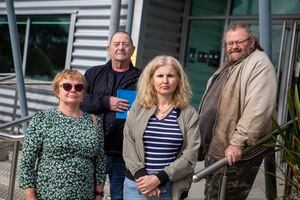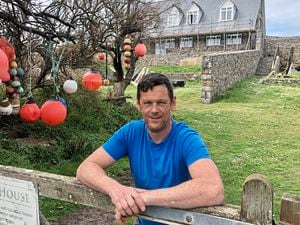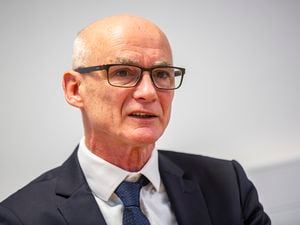No march, but we’re still here – protesters
THERE will not be another march against GST organised by the group who attracted thousands of people ahead of the last States’ debate on the topic in February.

However, those behind Guernsey People Against GST have not gone away.
‘We’re still here. We’re still looking at things,’ said Anne Le Cheminant. ‘We’ve had quite a few meetings and we’ve met with other people and other interested groups.’
Mrs Le Cheminant said she thought they had been listened to after January’s march.
‘There was a really good turnout and GST wasn’t voted for,’ she said.
The march was recent enough that States members would remember its impact when they debate Policy & Resources proposals, she said.
‘It’s still fresh in people’s minds,’ she said.
‘And I’m seeing red ribbons everywhere.’
Mrs Le Cheminant said the committee’s funding and investment report was ‘very, very poorly written’.
‘There was no logic to the structure of that document. There was no “this is the situation and this is how we want to resolve it.” You had to delve to try and make any sense of it.’
Group member Lance Vaudin said he lost the will reading the report.
He thought highly of the report earlier in the week from the Chamber of Commerce.
‘They’re not necessarily for or against GST but they are bringing things to light about savings.’
Karen Jolly said P&R seemed to have decided on a solution which they were going to stick to no matter what other ideas might be put forward.
‘I think the term is “bias confirmation”,’ she said.
‘They’ve gone into this thinking “How do we justify GST?”, not “what is the alternative to GST?”.’
The group believes that the best thing the States could do would be to reject all of the proposals, as it did previously.
Mrs Le Cheminant said its message is ‘don’t create any harm at the moment, not until there’s been a proper professional review, not just of how are they going to fund capital projects, but how are they going to fund the future?’
, The group will be organising a protest outside the States ahead of its meeting, which starts at 9.30am on Tuesday 17 October.
P&R president to face two hours of GST questions
POLICY & Resources president Peter Ferbrache will be on hand to answer islanders’ questions tonight.
The Q&A event is running between 7 and 9pm at Les Cotils and questions can be asked about the Funding & Investment Plan debate, which is set to take place in two weeks’ time.
P&R is proposing a 5% goods and services tax on almost all purchases, or 6% excluding food, together with additional borrowing of £350m., to help fund more than £500m. of capital projects and deal with a hole in States finances projected to grow to
£50-£100m. annually over the next decade.
As earlier this year, when P&R failed to get States backing for its tax plans, there has been a strong PR campaign to try and win over the public and deputies.
That has included Deputy Ferbrache using Facebook to enter into debate with the public on one of Guernsey’s most active social media pages – Guernsey People Have Your Say.
His initial post, asking people to reach out with their questions, attracted nearly 900 comments and more than 400 reactions.
Since then he has made seven more posts to the group and engaged with many of the posters.
His latest update yesterday said he was grateful for all the interest in his posts.
‘I know you appreciate because of other time pressures I have not been able to respond to everybody,’ he said.
He added that GST was not a done deal. ‘P&R has really looked at a wide range of options and just genuinely believe that this package benefits those less well off,’ he said.
‘It does include cost reductions in the States and it is necessary to raise enough money to provide essential services and to provide investment in our infrastructure which we’ve not done enough of for some years.’





